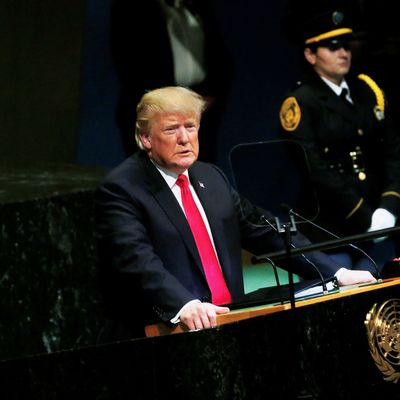
President Trump treated the U.N.’s ambassadors, heads of state, and other dignitaries to their very own Trump rally on Tuesday, kicking off his remarks with a mini-stump speech, then segueing into a ferocious recitation of things that threaten America, a grab bag of usual US concerns and far-right hobby-horses that will have every conspiracy theorist in the country cheering. Listeners who don’t study fringe U.S. national security policies, and how they have wound their way into the conservative mainstream since 9/11, were left somewhere between stunned and snickering.
Political reporters and fact-checkers could recite along with the list of dubious claims — the best economy, the lowest black and Hispanic unemployment, the military recovered from weakness. Eventually the chamber could not contain itself and erupted in laughter. That just doesn’t happen at the U.N. — one sits in silence through the dronings of election-fixers, mass murderers, and garden-variety despots by the dozens. ABC producer Rym Momtaz pointed out that not even an “incoherent stream of consciousness” from the late Libyan strongman Muammar Gaddafi got laughs from the U.N. audience.
For all the talk among his critics of Trump’s inability to take criticism, it must be said that he laughed along with them, and then pressed on. I don’t, however, know whether he could see — as watchers of the live-stream could — when he later said that Germany was making itself close to totally dependent on Russian energy, the German delegation bursting into laughter.
The main body of the speech read like another American institution: old men getting together to trade theories over what is destroying the world. It was a useful window into how Trump and his core supporters — including National Security Advisor John Bolton and a significant part of the conservative national security establishment — view the world and America’s place in it.
American independence, Trump told the world leaders, is under threat. Not from Russia or China, nor from al Qaeda or ISIS, but from “global governance.” In response, Trump pledged that the U.S. would favor “independence and cooperation” and would never tell any country how to live or worship — asking only that U.S. sovereignty be respected in return. Later in the same speech, he threatened countries with cuts in foreign aid if they didn’t comply with U.S. wishes (much as U.N. ambassador Nikki Haley has recently threatened other U.N. members over their votes) which seems inconsistent, to put it mildly.
Trump had nothing new to say on U.S. policy towards Iran, other than that the U.S. is under threat from Iran — a day after European countries unveiled a policy intended to get around the U.S. reimposition of sanctions — but he said it in full “fire and fury” mode, which will likely prompt a riposte from Iranian leaders.
The U.S. is not under threat from North Korea, per Trump, who, while he dialed back his recent optimism about another summit coming soon with Kim Jong-un, went out of his way to thank the North Korean autocrat and claimed that “missiles had stopped flying” on the peninsula.
Did I mention that the U.S. is not under threat from Russia? Apparently, Ukraine is not either, as Trump neglected to mention it — surprising even Russian media, which had expected some criticism, per analyst Julia Davis.
The U.S. is, however, under threat from socialism. A ranting paragraph about its evils eventually got around to criticizing Venezuela, whose leftist government is collapsing amid violence and humanitarian privation. The text felt like it had drifted in from the politics of the 1950s or, more likely, from Fox commentators. It seems it’s not just young American progressives who find socialism a useful banner.
The U.S. is under threat from trade. Bob Woodward’s book Fear recounts Trump scrawling “TRADE IS BAD” in the margins of a speech draft. He didn’t go quite that far today, but he did walk the audience through his own understanding that, in order to be “good,” trade must precisely balance. No one in the audience got up and tried to walk him through how sales of services and financial flows also figure in the global economy. Who could blame them?
I’ve neglected some threats Trump mentioned — the International Criminal Court, human trafficking, foreign aid. But here’s a threat he didn’t.
Extreme suspicion of foreigners, and an eagerness to blame all change and trouble on foreigners, has always been an undercurrent of the U.S. approach to the world. For fifty years, both parties used the threat of communism to keep extreme nationalism out of the mainstream in U.S. foreign policy thinking. Now, it’s the house ideology of one of our two political parties. The rest of the world has been put on notice that it needs to plan accordingly. And that’s a threat — to American jobs and businesses, to the safety of Americans traveling overseas, to our ability to call on others for help when we need it.





























